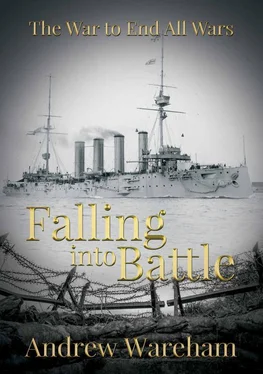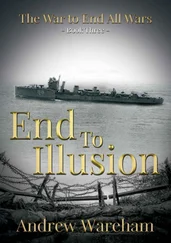“Cease fire. Downhill to the canal path. At the double!”
The Germans reformed to the east while Richard led his half company west, reaching the canal with no further casualties.
“How many lost, Sergeant?”
“Just five more, sir. Four of them dead – firing from cover, like we was, they mostly either hits the head or misses completely, sir. One of ours wounded; Private Thomas, clipped across the side of his cheek and ripped half his ear’ole off. Blood everywhere and it hurts, but it ain’t too bad as long as it don’t go rotten on him. Going to scar him up a bit, that’s all.”
“Nine dead already and Thomas won’t be carrying his rifle. Three existing wounded who ought to go for treatment when they can. Have to get them back as soon as it’s practical. Not too good seeing as we started with thirty-nine including you.”
“Could be worse, sir. Twenty-six of us left untouched and all of them know what it’s about now. Best we work our way along this bit of a track by the stream, sir, and make it to the village and set ourselves up where we can hold the bridge. The lads will be able to get some kip in comfort in the village. Be able to cook up a meal and eat it sitting at a table. Be a chance to wash up as well. All of them will be better for getting a shave and cleaning themselves. Use a proper outhouse, too, instead of squatting behind a bush. Makes a difference, sir.”
They reached the village by mid afternoon, were able to set themselves up in a sensible defence.
The village was small, not unlike the industrial villages of Northamptonshire, almost homelike. There was a pair of pitheads, the big wheels dominating the four redbrick terraces of tiny, two up, two down hovels. The two streets were cobbled, running uphill from the canal wharf on one side to the railway tracks on the other. There was a single store, no bigger than the houses. Unlike the villages at home, where the boot and shoe bosses lived in sight of their workshops, there was no sign of the mine-owners’ houses – they were obviously miles away, out of the muck and smells.
“Dirt poor, and empty, Sergeant Grace.”
“No civvies to get in our way, sir. Railway line keeps south of the canal and don’t cross it, so there’s only the road bridge to worry about. Tracks are up on a bit of an embankment as well. Be able to hunker down there if we get pushed back from the canalside. Pity we ain’t got one of those machine guns ourselves, sir. Do well up high on the railway. Take a look at the pitheads, sir. Might be able to set up there. Close to the bridge, they are.”
Road bridge and collieries were at the west of the housing together with a set of sidings off the railway line, big enough to make up the coal trains. There was a stableyard and a wagon park as well, both empty.
“Nothing on wheels to block the bridge with, sir.”
“Pity. No motor vehicles – but if there had been any, they would have used them when they evacuated the village.”
They looked about and found a locked and barred shed with a red sign for danger.
“Do they use explosives in coal mines, Sergeant Grace?”
“Don’t know, sir. Might do.”
“Can’t get into it. The door’s locked.”
“Wooden shed, sir. Have a look over in the workshop by the pithead, sir.”
There were sledgehammers and crowbars in the shop and the wooden shed was lightly built from matchboard.
“Always the same, sir! Put a big lock on the door and make the walls of cheap quarter-inch pine wood! No sense to it!”
Richard wondered just how his sergeant had such experience of breaking into locked premises – but that was none of his business, not in the Army.
Two of the bigger men ripped a hole through a wall, under Sergeant Grace’s supervision.
“Looks like black powder, sir. In kegs. Not a great deal of it – four small barrels, with brass hoops, sir, that’s how you know it’s powder. Iron can spark but brass can’t. Looks like fuse in the coils, sir. What they used to call slowmatch. Little cardboard tubes, look, sir, on that rack. From what I have ever seen of engineers and demolitions, I’d say they filled the cardboard with powder, stuck a length of fuse in and crimped it over somehow. Stick the cartridge you’ve made into a hole and set a match to it and bugger off, if you’ll pardon my French, sir.”
“Excellent, Sergeant Grace. Take a few men and dig a hole in the bridge and stuff it full of those tubes and see what happens… Second thoughts, best you should set the men up in the village. I’ll see to the bridge.”
Blowing up the bridge with his own hand would make a good report to the colonel, and the newspapers might like it, if they got to hear the tale.
“How do you open those barrels, Sergeant Grace?”
“Copper mallet, I would reckon, sir, so as not to have sparks… Ought to be tools in the shed, here…”
There was a chest in the corner, unlocked.
“There you are, sir! Mallets and little pinchbars, made out of bronze, by the looks of them. A auger as well, a big drill bit the same gauge as the cardboard tubes, for making the holes to put ‘em in. Put the pinchbar though the hole at the top of the auger and turn. I’ll just make up the cartridges now, sir. Take half an hour or so while you have a look down at the bridge to see what to do.”
The canal bridge was just the same as those Richard had seen in England. He remembered that most of the canals and railways in France and Belgium had been made by English contractors in the previous century, so it was reasonable that things would look the same.
Hump-backed, a single arch perhaps fifteen feet above the water at its highest, and a bit more than forty feet across and wide enough to take a single farm wagon with a bit to spare. It was brick built, the road gravelled to either side.
Richard had six men with him, and the auger. One of the farm lads knew what to do.
“Dig down on this bank, sir. Go down a few foot and angle under the archway a bit. Blow ‘er up from under, sir. Three years back I see they clear the old orchard what my uncle got out towards Finedon way at home, sir. They old apple trees warn’t cropping good no more so ‘e got a bloke to take ‘em all out. With black powder, like we got ‘ere. Drilled a small ‘ole down under the tree and popped a charge in and blew it and the old tree just jumped up in the air, so it did, and sat on the ground on top with ‘er roots spread out around. Carted they off and logged they for firewood and put new little saplings in they place and come two years there was a new orchard just starting to crop. Would ‘ave taken years to cut they down and dig the stumps up.”
“Right, Private Miller. You have seen it done, so get busy with the auger and put the holes in for me.”
“Right, sir. Should be easy, sir. Soft ground to drill through and underneath the footings.”
Two hours and they had six holes, each the better part of five feet deep and angled down under the edge of the brickwork. Sergeant Grace had provided six of the cardboard blasting tubes, each with twenty feet of fuse trailing from the top.
Richard took the first tube, rather nervously and fitted it into a hole and pushed it down with a long stick. Five minutes saw all six in place.
“Stamp ‘em down a bit, sir, so the blast don’t come straight back up the hole.”
There were six trailing ends of fuse to be lit.
“Bloke what did my uncle’s place put the ends together and lit ‘em all at once, sir. Then he ran, quick.”
Richard followed the advice.
“Slow old stuff, that match, sir.”
They had waited five minutes and the trail of smoke was no more than halfway down the fuses.
“Sergeant’s waving, sir.”
Richard turned, saw Grace up on the low railway embankment, perhaps fifteen feet higher than him. He was pointing to the hilltop.
Читать дальше












